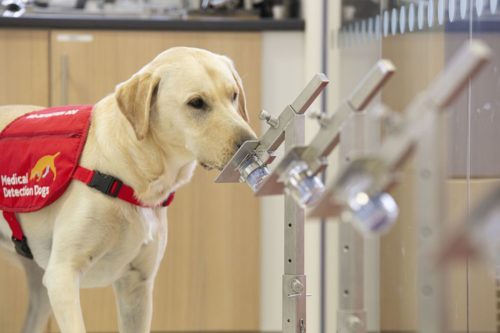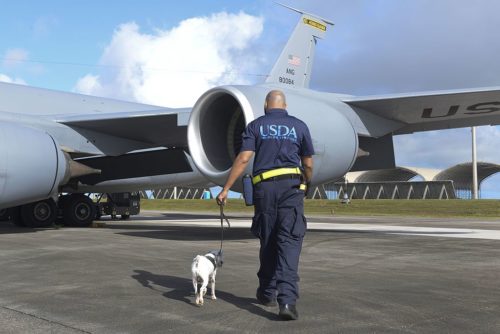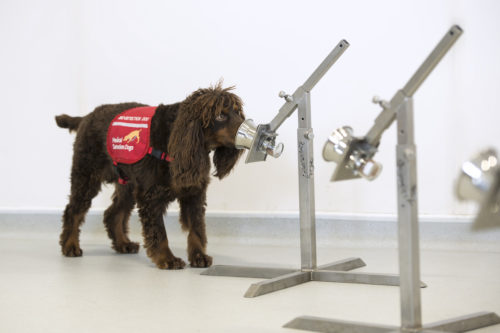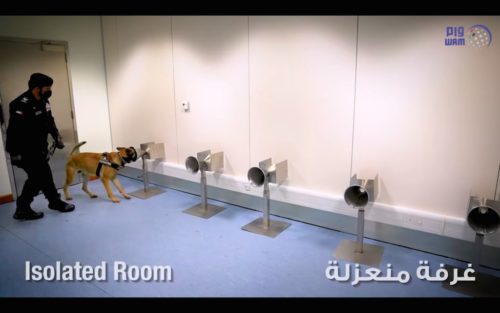Dogs are being trained to sniff out COVID-19, the disease caused by the new coronavirus. So far, dogs seem to be quite good at detecting the illness, but it’s not clear yet how useful these skills will be.
Several groups of scientists around the world are training dogs to detect the coronavirus. There are programs in Europe, South America, Asia, and Australia.

(Source: Neil Pollock, via Medical Detection Dogs.)
Dogs are known for their sense of smell. Because of the way their noses work, a dog’s sense of smell can be up to 40 times stronger than a human’s. Dogs have been trained to locate bombs and drugs. They can even smell certain human diseases like malaria, cancer, and diabetes.
Training dogs to sniff out the coronavirus could create a quick and harmless way to check someone for the virus.

(Source: Katrina M. Brisbin/US Air Force [Public domain], via Wikimedia Commons.)
While the coronavirus itself doesn’t have a scent, if you get sick, your body gives off a certain smell through your sweat, spit, or pee. This smell is what the dogs are trained to sniff out. To train the dogs, scientists need lots of samples, both from people who’ve gotten the coronavirus and those who haven’t.
Scientists say that the dogs can smell the virus even if the person isn’t showing any signs of illness. That could be important, since the coronavirus can be spread by people who don’t even know they’re sick.
😕
This image has not been loaded because of your cookie choices. To view the content, you can accept 'Non-necessary' cookies.
The coronavirus doesn’t have a scent, but if you get sick, your body gives off a certain smell. To train dogs, scientists need lots of samples, both from people who’ve gotten the coronavirus and those who haven’t. Above, samples being used to train dogs in France.
To train the dogs, scientists place an item carrying the coronavirus (such as a sock) in a jar. The dogs are given a chance to smell the item, as well as other items without the virus. When the dogs correctly select an item with the coronavirus, they get a treat. Soon they learn that sniffing out the virus leads to a reward.
The training can take from 6 weeks to 6 months, depending on whether the dog has been trained for similar work before. Several different types of dogs are being trained, including German Shepherds, Golden Retrievers, and Labrador Retrievers.

(Source: bexarts.co.uk, via Medical Detection Dogs.)
The plan has a few drawbacks. Not only does it take a long time to train the dogs, it’s also not clear how many people the dogs could check.
During training, scientists can control how often coronavirus samples come up, and make sure the dogs get regular rewards. In real life, the dogs might have to do a lot of sniffing before they find someone with the coronavirus.
😕
This image has not been loaded because of your cookie choices. To view the content, you can accept 'Non-necessary' cookies.
In training, scientists can control how often coronavirus samples come up, making sure the dogs get regular treats. In real life, dogs might have to do a lot of sniffing before they find someone with the coronavirus. Above, dogs in Chile learning to detect COVID-19.
Still, there are strong signs it could work. In some tests, dogs have had a 94% success rate. In Dubai, United Arab Emirates, dogs are already working in airports to help identify sick people.
Some people worry that the dogs could catch the coronavirus themselves and spread it. Scientists say that’s unlikely. Still, to prevent the dogs from getting sick or spreading the virus, scientists are being very careful.

(Source: Emirates News Agency, Screenshot via YouTube.)
Items with the coronavirus are specially treated so that they keep their smell, but are safe for the dogs. The dogs are even tested regularly to make sure they’re healthy.
If the training programs are successful, scientists hope to train even more dogs, and expand the programs to other countries.
